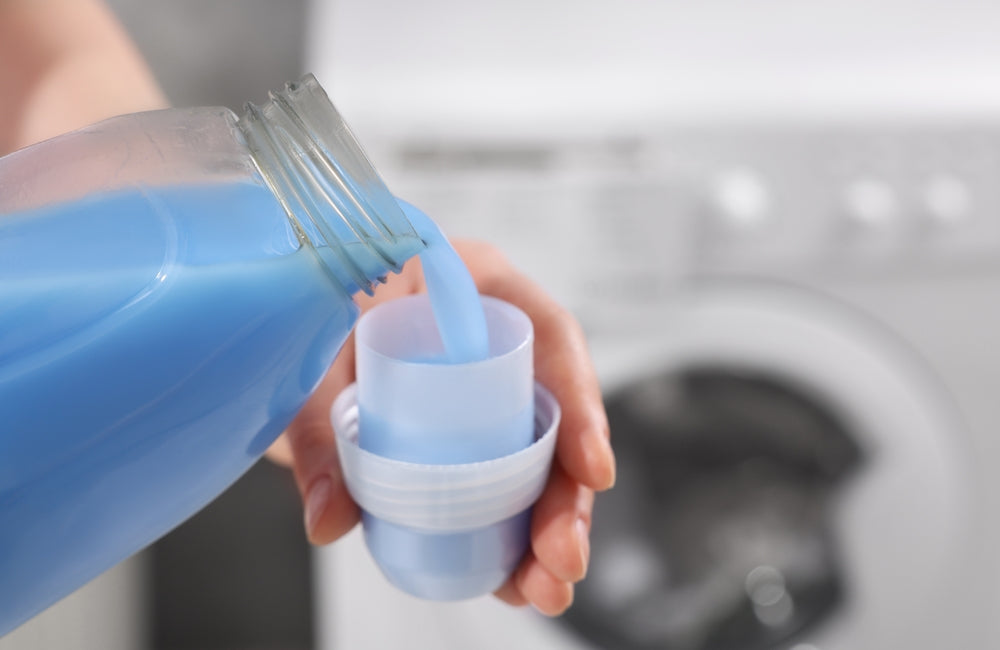Free U.S. Shipping On Orders Over $150

5 Reasons Why You Should Stop Using Fabric Softener in Your Laundry
Posted on
For many of us fabric softener is an essential part of laundry. How else are you supposed to get your clothes to smell so nice? Fabric softener also reduces wrinkles on clothes, makes them softer and reduces static.
But you are probably better off without it. Experts say that fabric softener is bad for your washing machine, your clothes and your skin as well. I know forgoing softener in your washer is a hard sell for many people, but here’s why you should ditch it.
What Does Fabric Softener Do?
Getting thrown around and whizzed around at high speeds is tough on clothes fibers. Washing machines squash the fibers on clothes. When clothes dry, these squashed fibers make the clothes feel rough. They can also cause wrinkles. This is particularly noticeable on air dried clothes.
A fabric softener causes fibers on clothes to stand or fluff up, giving clothes a softer feel and helping smooth out wrinkles as clothes dry. In addition, fabric softeners reduce static on clothes and add a pleasant scent.
Fabric softeners work by depositing an electrically charged chemical coating on clothes. It’s this coating that fluffs up fibers on clothes. But it can also cause a number of problems.
Five Problems With Fabric Softener
1. It Clogs Your Washing Machine
Over time fabric softener leaves a residue inside your washing machine. If it builds up too much it can clog your washer, causing it to stop working properly.
But even if it doesn't get to that level, fabric softener residue in the washer encourages the growth of bacteria, mold and mildew. This can leave your clothes with an odor, reduce the washing machine’s performance and even make clothes more allergic.
Regular detergent already causes residue in your washer. Adding fabric softener causes even more residue buildup. That’s why it is important to regularly deep clean your washing machine. Do so more frequently if you use fabric softener.
2. It Can Cause Odors on Clothes
Fabric softener is supposed to make clothes smell nice, but it can actually do the opposite. Remember all that residue that it leaves in the washing machine? If it builds up too much, your clean laundry might start smelling like mold and mildew.
If you are washing sweaty clothes like your gym wear, fabric softener can make the sweaty smell stick to your clothes. That’s because the chemical coating prevents detergent and water from removing smell molecules from clothes.
That’s why care labels on most activewear prohibit the use of fabric softeners.
3. It Affects Moisture Wicking Performance on Fabrics
The fabric softener coating on clothes doesn't just trap odor molecules, it also negatively affects the moisture-wicking performance of fabrics. This is particularly bad for activewear and outdoor wear as it is designed to wick away sweat.
The waxy coating prevents fibers from absorbing sweat. So you might find that you sweat a lot more or feel hotter and more uncomfortably in your clothes.
The same goes for towels, bathrobes and any other items designed for absorbency. Do not use fabric softener when washing them.
4. It Make Clothes More Flammable
The effects of fabric softener can go from uncomfortable to dangerous. The fluffing up effect of fabric softener makes clothes softer. It also increases the surface area of fibers, making it easier for them to burn.
Using fabric softener reduces the flame retardant properties of items like pajamas, bedding and curtains.
5. It Can Irritate The Skin
The chemicals and fragrances in fabric softener can cause contact dermatitis in people with sensitive skin and those vulnerable to skin problems like acne. If you have a history of skin issues, avoid using fabric softener in your washer.
Remember that fabric softener residue can increase bacteria, mold and mildew in the washing machine. These can transfer to your clothes and affect your skin.
Fabric Softener Alternatives
Fabric softener does not in any way make your clothes cleaner. In fact, it can prevent your clothes from getting fully clean. You won’t lose much when you stop using it. If you still want your clothes soft and smelling nice, there are some better alternatives.
- Scented laundry detergent can give your clothes the same nice scent. You can also apply fabric freshener on clothes after cleaning them. But keep in mind that these fragrances can still affect you if you have sensitive skin.
- If you just want your clothes to smell fresh, add white vinegar to the fabric softener compartment. Vinegar actually deodorizes clothes and can be particularly helpful for cleaning sweaty clothes. P.S: See note on vinegar below.
- Vinegar also softens clothes.
- To deal with static, air dry your clothes.
- If you are struggling with clothes that won’t stop stinking, consider switching to odor-resistant clothes. Clothes made from natural fabrics like cotton, wool and linen don't hold onto odors as much as synthetic clothes. You can also get one of Hercleon’s odor-fighting clothes. They have anti-bacterial treatment that keeps them fresh for days even with multiple wears.
A Note on Using Vinegar in a Washing Machine
Some people are concerned about vinegar corroding rubber seals in their washer. We could not find any definitive proof that this is true. To reduce the risk anyway, do the following.
- Use regular distilled white vinegar, the kind that’s made for use in the kitchen (3-5% concentration). It’s a weak acid that’s safe for rubber gaskets. Don’t use cleaning or commercial vinegar since it’s stronger.
- Dilute the vinegar in a 1:1 water ratio to further weaken it before adding it to the washing machine.
- Wipe down the rubber seals of your washer after each cycle to remove any vinegar remaining on them.
Quick links
Contact
6063 Hudson Road #160
Woodbury, MN 55125
Yo@hercLeon.com
Leave a comment: